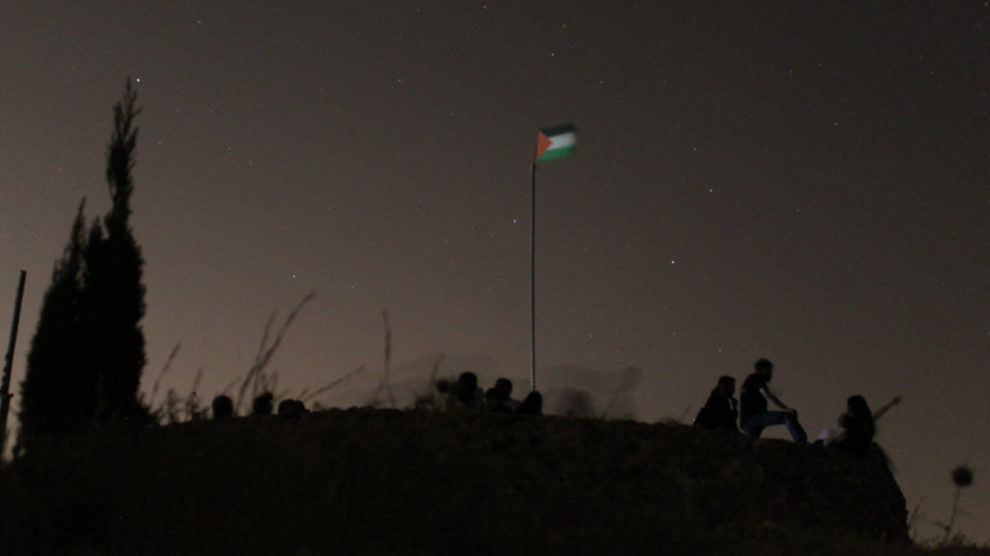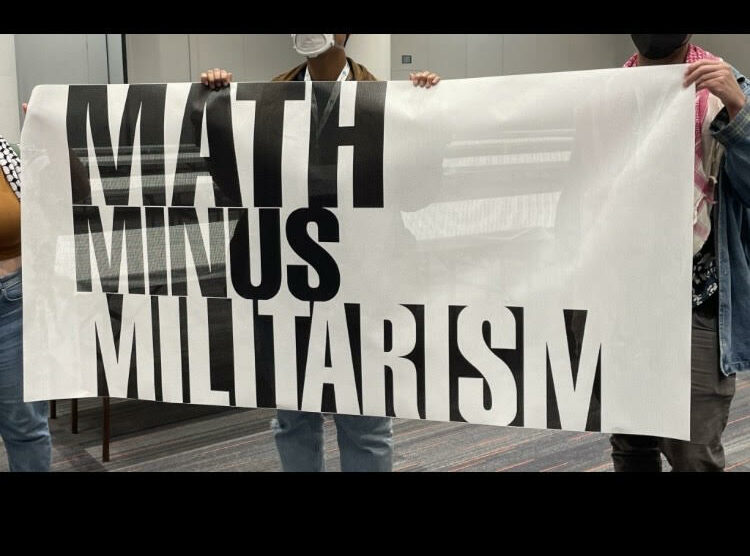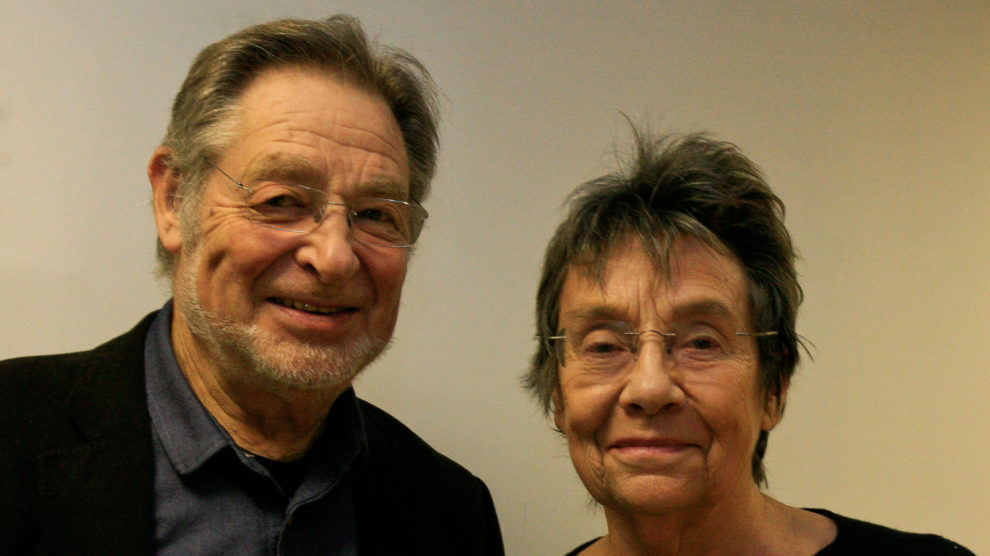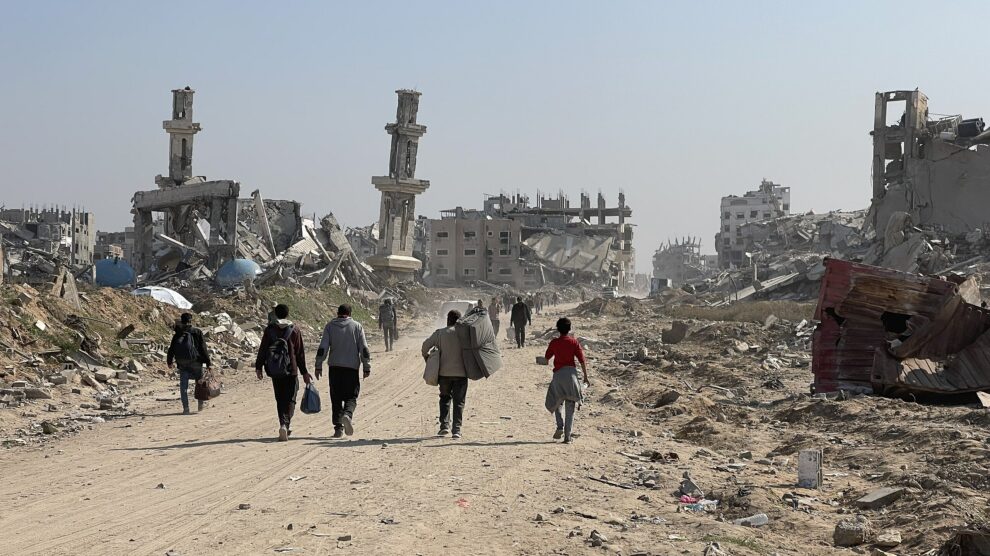Childhood Detention Under Military Occupation
By Charlie Jaay
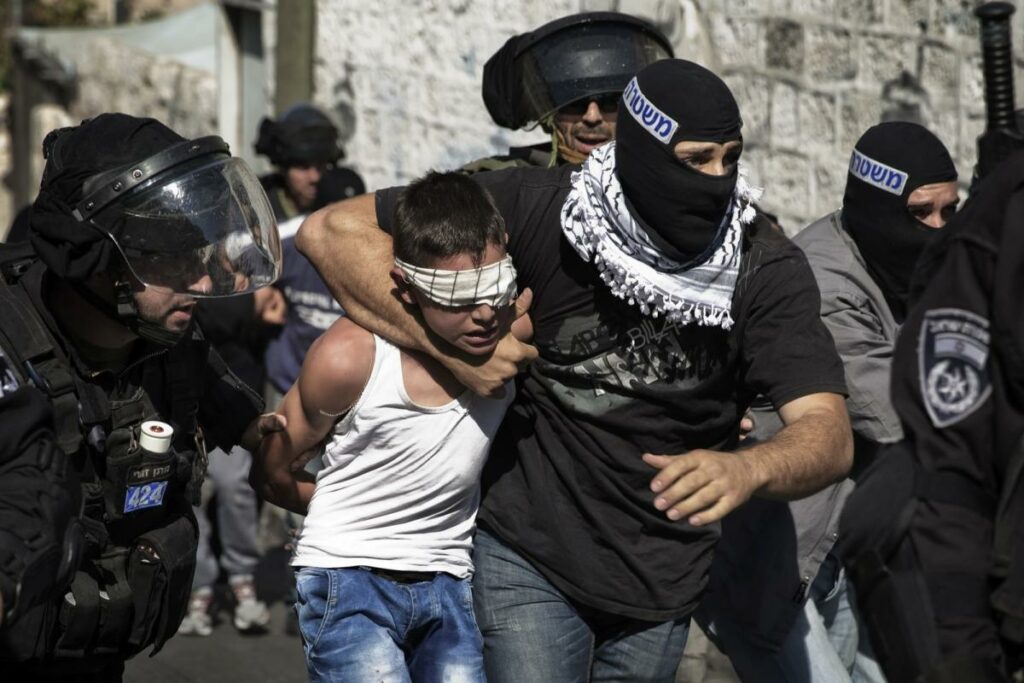
“Our children are a point of weakness for us. When they are targeted and severely punished, the family feels guilt, and the whole Palestinian society feels the injustice, trauma and intimidation—it is, of course, deliberate!” – Dr. Samah Jabr
Since 1967, Israel has maintained its illegal military occupation over Palestine, inflicting immense suffering through a combination of ruthless policies, rampant discrimination, and violent military rule.1 In the case of East Jerusalem and the West Bank, illegal settlements take the form of house demolitions, the expropriation of land, and an ever-expanding colonial presence.2
Palestinians have the legal right under international law to resist this violent and dehumanizing occupation. Children are profoundly impacted by the ongoing situation, and participate in acts of resistance.3 Resistance represents a way for these children to refuse to participate in their own suffering and maltreatment. This resistance can take many forms, such as throwing stones at the Israeli military’s armored vehicles, attending demonstrations, or posting on social media.4 These children also resist and act as obstacles to Israel’s occupation by simply existing and standing firmly on their land, as the ultimate aim of Zionist settler colonialism is to eliminate the Palestinians.5 Whichever way these children resist the occupation attempts to punish them with its brutal cruelty.
Mohammad Hureini is an activist and human rights defender. “I grew up under the constant threat of settler violence, seeing the night raids of the army in our house, kicking us out in the cold. It made me grow up quickly, and made me want to fight for our rights, and to end occupation,” he says.
When he was just 13 years old, Hureini and his elder brother founded Youth of Sumud, a nonviolent resistance group of young activists from At-Tuwani and the neighboring villages that make up Masafer Yatta.6 Youth of Sumud encourages local families to remain on their land in the face of ever-mounting pressure.
“Since I started my activism, up until the age of eighteen, I was arrested eight times, for nothing except accompanying children to school and protecting my land,” Hureini says.
Hureini’s experiences are not unusual. Palestinian children experience daily violence and intimidation at the hands of the Israeli military. Each year, hundreds are detained and prosecuted, and this not only affects them, but also their family and the wider community. What follows is an outline of what children, partaking in acts of legal resistance, may endure at the hands of the occupation: arrest, military court, imprisonment, and the challenges of reintegration upon release.
The Capture
In the West Bank, more than 1,800 military orders intervene in almost all aspects of Palestinian daily life.7 Israeli police, soldiers, and private security firms are stationed throughout the area to ensure that these orders, justified under the premise of “state security,” are adhered to, and children often find themselves in confrontations with these Israeli armed forces.
Dr. Samah Jabr has been Director of the Mental Health Unit of the Palestinian Authority since 2016. She spoke candidly about the constant provocation Palestinian children experience on an everyday basis. “Adolescence is a phase where people search for their identity. But soldiers are targeting these children, provoking them at checkpoints when they go to school,” she says. In the West Bank and East Jerusalem, the mental health system faces specific challenges linked to the occupation, specifically a lack of reporting, treatment, and funding.8 As one of the very few psychiatrists in the region, Dr. Jabr sees firsthand the psychological effects the Israeli occupation has on child ex-prisoners and their families.
“Every Palestinian comes with a background of historical trauma, brought upon their grandparents and parents. Every young person also has their share—when a school mate is shot, when a cousin is imprisoned, when a neighbor’s house is demolished,” she explains.
“Soldiers are at our doorsteps, and if these children react, punishment is extremely severe. So they go to prison frequently,” says Dr. Jabr. In the last 57 years, an estimated 39,000 –56,000 children have been arrested and detained, often without warrants, charge, or trial.9
Since the early years of the occupation, Israeli forces have pursued a systematic and deliberate campaign to destroy Palestinian life by targeting and detaining juveniles.10 “Usually a child’s arrest and detention is done in a way that emphasizes the control and supremacy of the Israeli system, and the Israeli army, in a demonstration that terrorizes the whole family, even sometimes the whole neighborhood,” Dr. Jabr explains.
Every night in occupied Palestine, armed Israeli soldiers force their way into Palestinian homes, waking up the household and arresting children. This leaves Palestinians constantly vulnerable to, and fearful of, arbitrary invasions into their homes.
Interrogation
Once arrested, children are forced into an Israeli military vehicle and transported to a nearby military camp. Most of these military camps, which host interrogation and detention centers, as well as police stations, are in the West Bank’s illegal settlements.11 Evidence confirms that abuse in these locations, which play a key role in the arrest, transfer, interrogation and detention of Palestinian children, is prevalent. These settlements also act as staging posts for military raids on Palestinian villages and so these illegal settlements and military camps engender deep-seated resentment across generations. Not surprisingly, according to research by Military Court Watch, 98 percent of Palestinian children detained by Israeli forces in the occupied West Bank lived within a few kilometers of these settlements.12
According to Defense for Children International – Palestine (DCIP), children typically reach interrogation while blindfolded and sleep deprived, and physical and psychological violence are often used to forcibly extract confessions from them.13
“During interrogation they are usually told that their classmates, cousins, or neighbors have given their name, so these children often develop mistrust issues, and a sense of guilt and responsibility can be injected into them,” says Dr. Jabr. “Sometimes they are told lies by the interrogators, or told the house of their family will be demolished if they don’t confess or inform about others,” she adds.
Sahar Francis is a Palestinian lawyer and Director of Addameer, a Palestinian NGO which provides legal assistance and support for prisoners, and advocates for their rights.14 “The occupation authorities do not adhere to laws that allow parents and lawyers to attend interrogation sessions with children. Instead, children are arrested from their homes late at night or from the streets without allowing any of their parents or lawyers to accompany them,” Francis says. “This means that Palestinian children are interrogated without lawyers who could provide legal advice, thereby depriving Palestinian children of their right to receive effective legal counsel.”
General Director of DCIP, Khaled Quzmar, has worked for more than twenty years as a defense lawyer, representing many child prisoners inside the Israeli military courts. He contrasts the experience an ordinary Israeli would have with that of a Palestinian child. “The army will never go into an Israeli’s house and raid it, beat the child, and take him from his bed in the middle of the night,” he says. “They would never take this child for interrogation without a family member or lawyer, without even informing the child why he was arrested. In Israel, none of this is allowed.”
Palestinian children, on the other hand, are often detained by Israel for longer periods before being brought before a judge, and denied the right to have a parent present during questioning.15 Importantly, they are also not interviewed by a probation officer, who would advocate for alternatives to detention, as is the case for Israeli children.
Hearing and Trial
In the occupied West Bank, two separate and unequal systems of law operate.16 A civil legal system is applied to Israeli citizens, including almost 520,000 illegal Jewish settlers, whilst a military legal system, which has far fewer rights and protections, is applied to Palestinian adults and their children.17
“The Israeli civil courts work according to Israeli civilian law—the Israeli youth law when it comes to children,” says Quzmar, “and these laws are governed by an international humanitarian justice standard. Israeli children from the illegal settlements in the West Bank are prosecuted and treated according to these.”
Quzmar contrasts the situation between Israeli and Palestinian youth, noting: “Palestinian children living just outside the settlement are prosecuted in a military court, where there is nothing related to these laws, and they have no rights. The only thing that applies there is the Israeli military order.”
In this draconian military court system, the judge, prosecutor, and translators are all members of the Israeli armed forces. Making things worse, hearings and statements are communicated in Hebrew, which Palestinian children do not understand.18 While designed to sound legal to the international community, this system is clearly intended to exert physical and psychological control over Palestinian captives.
In addition to the structural injustice of Israel’s military court system, the courts also lack basic safeguards expected by international law to ensure a fair trial. These safeguards include the use of arrest as a last resort, advance notice before questioning takes place, minimal use of restraints, and the presence of a legal guardian or adult family member during questioning.
Although international law states that civilians must never be brought before military courts, Israel persists in being the only country in the world that automatically and systematically prosecutes children in them, and these courts remain at the heart of Israel’s regime of repression and control.19
Sentencing and Imprisonment
“I assure you that if the Palestinian children, who are prosecuted in military courts, were offered a fair trial like in the Israeli civil system, the percentage of convictions would be less than one percent,” says Quzmar.
Far from one percent, conviction following indictment in the military courts is nearly inevitable.20 Most people will choose to plead guilty, as the alternative is a lengthy and systematically unfair trial. In a plea “bargain,” the parties can agree on the charges and on the sentence the prosecution will seek. In return, the defendant agrees to plead guilty to the facts as set out in the indictment.
“These courts do not obtain any kind of justice. It’s just a kind of revenge, to humiliate, punish, and torture,” adds Quzmar. “Judges never behave as judges, only as interrogators, or as the police, and they treat children as terrorists, not as human beings.”
At the time of this publication, about 45 of the 250 children detained are in administrative detention, according to Addameer, meaning they have been arrested and imprisoned indefinitely, without charge or trial. Such detention is not connected to any actual offense but is a preemptive measure against hypothetical future offenses. Only the Israeli judge and Israeli prosecutor have access to the files that are used to justify the continued detention, making it impossible for a defendant and their lawyer to mount a proper defense.
Israel argues that this oppressive policy, lacking in transparency, is necessary to combat terrorism. However, human rights groups such as Amnesty International claim this widespread policy is systematically used as a tool to persecute Palestinians and, yet again, prevents detainees from being provided a fair trial.21 The detainee, who never knows the charge on the “secret file,” could be given an initial detention order of three to six months, but this can be renewed indefinitely, without any evidence, for as long as the Israeli occupation decides.
Detention by the Israeli military of Palestinian children means they are cut off from their family and everyday familiar surroundings. Their lives are put on hold, and they are at the mercy of the Israeli authorities. Yet, the situation is no better for those who find themselves in home detention.
Home detention is a policy and form of punishment often used in East Jerusalem, where it is employed as a substitute for imprisonment in a locked facility, and affects not only the child but the entire family.22 Parents and siblings are forced to state the following in court: “I will stay home and not leave the respondent alone in any way. If he escapes, I will call the police.”23
Failure by the parents to report their child to the authorities if they leave the house runs a high risk of severe legal and financial consequences. In interviews, home-arrested children discussed how their home had been transformed from a safe place into a military occupation of the home.24
Release and Reintegration
When the Israeli occupation detains Palestinian children and deprives them of their fundamental rights to education, freedom of movement, and spending time with friends and family, their lives are totally disrupted. Moreover, education for children within Israeli prisons is notoriously poor.25
Wahbeh Asfour is Director of the East Jerusalem YMCA Rehabilitation Program, which started in 2007, and aims to support the psychosocial well-being of ex-detainee children.26 More than 200 ex-detainee children from across the West Bank and East Jerusalem, and their caregivers, participate in this program each year.
“The children are psychosocially shattered, overwhelmed by significant fear and anxiety about being rearrested and attacked by Israeli forces. Their dreams now center on just moving freely. They don’t trust anyone and have no safe spaces to play,” says Asfour, “but we aim to restore their sense of normalcy and help them build a positive future.”
Similar to the YMCA’s rehabilitation program, Dr. Jabr also helps caregivers as well as their children. “When they come out of prison, many children have serious relationship issues with their parents, and this is a serious problem in their development, because they still need parental authority. At the same time, families are injected with guilt when they can’t prevent the detention of their child, so my work also supports parents and helps them not to feel guilty,” says Dr. Jabr.
“Prison deprives and damages, and imprints on your brain,” she says, “especially when it is accompanied by humiliation, intimidation, interrogation, and torture.”
Breaking Through the Fear
Now 20, Hureini lives in At-Tuwani, where he was born and raised. His family bought land there when they fled from their previous home during the Nakba in 1948. But, like all those in their community, their way of life and existence is now threatened, yet again, by the occupation.
“They are banning everyone from having a home, and living in safety on their own land, while the settlers who attack us are under the protection of the Israeli forces and police,” argues Hureini.
Settler violence is an increasing problem in At-Tuwani, which is only 300 meters from the illegal settlement of Ma’on and close to its outposts. Hureini says Palestinians living in the area are often violently attacked by settlers in their homes and on their land. Their properties are destroyed, olive trees and land set on fire, and livestock killed. Children from neighboring communities are also attacked when they make their way to school. Even as a child, Hureini and others from his grassroots movement, along with international volunteers, accompanied and protected these pupils.27 Hureini has seen these settlers, who are often armed by the Israeli government, run over his brother and shoot his cousin.
According to Hureini, being a witness to the reality of the occupation as a child made him want to fight back. “This is such an unjust reality,” he says. “While the settlers were attacking us on our land, the soldiers and police always came and arrested me instead of the settlers. Jewish settlers come from all over the world to live in the nearby illegal settlements, and we are losing our land. The community is struggling.”
Although Youth of Sumud faced many attacks from the settlers and Israeli army, their activism and networking has only increased as they have reinforced the Palestinian connection to their land.
“We have even been followed by the Israeli government, who has called us terrorists! Their main goal is to plant fear in our hearts, through terrorizing and arresting us—but for me it’s normal now. I have broken my fear barrier of the occupation.”
Meet the contributor:
Charlie Jaay: Charlie Jaay is a freelance journalist, with special interests in social justice and environmental issues worldwide.
Notes
- “Israel’s Occupation: 50 Years of Dispossession,” Amnesty International, June 7, 2017, https://www.amnesty.org/en/latest/campaigns/2017/06/israel-occupation-50-years-of-dispossession/.
- Virginia Pietromarchi and Mohammed Haddad, “How Israeli Settlers Are Expanding Illegal Outposts amid Gaza War,” Al Jazeera, March 19, 2024, https://www.aljazeera.com/features/longform/2024/3/19/how-israeli-settlers-are-expanding-illegal-outposts-amid-gaza-war; “Legalizing Dispossession: How Israeli Laws Enable the Take Over of Palestinian Land,” The Oakland Institute, accessed October 11, 2024, https://www.oaklandinstitute.org/legalizing-dispossession.
- “West Bank: Spike in Israeli Killings of Palestinian Children,” Human Rights Watch, August 28, 2023, https://www.hrw.org/news/2023/08/28/west-bank-spike-israeli-killings-palestinian-children.
- Urvashi Sarkar, “Janna Jihad: Meet Palestine’s 10-year-old Journalist,” Al Jazeera, April 28, 2016, https://www.aljazeera.com/news/2016/4/28/janna-jihad-meet-palestines-10-year-old-journalist; “Faris Odeh,” Wikipedia, accessed December 31, 2021, https://en.wikipedia.org/wiki/Faris_Odeh.
- Fayez A. Sayegh, Zionist Colonialism in Palestine (Beirut: Palestine Liberation Organization, 1965), https://freedomarchives.org/Documents/Finder/DOC12_scans/12.zionist.colonialism.palestine.1965.pdf.
- “Youth of Sumud,” Youth of Sumud, accessed July 31, 2024, https://youthofsumud.org/.
- “The Israeli Military Judicial System as a Tool of Oppression and Control: A Review of Military Order No. 1827,” Addameer, May 28, 2020, https://www.addameer.org/publications/israeli-military-judicial-system-tool-oppression-and-control-review-military-order-no; “Israeli Military Orders Database,” The Applied Research Institute – Jerusalem (ARIJ), 2022, http://orders.arij.org/.
- Mohammad Marie et al. “Anxiety Disorders and PTSD in Palestine: a Literature Review,” BMC Psychiatry 20, no. 509 (October 16, 2020), https://doi.org/10.1186/s12888-020-02911-7.
- Richard Falk, “The Systematic Torture and/or Ill-treatment of Protected Persons (Children) and Their Unlawful Transfer from Occupied Territory,” Military Court Watch, November 29, 2023, https://militarycourtwatch.org/files/server/2023/REPORT%202013-2023-Final.pdf.
- “Israel’s Apartheid Against Palestinians: Cruel System of Domination and Crime Against Humanity,” Amnesty International, February 1, 2022, https://www.amnesty.org/en/documents/mde15/5141/2022/en/.
- “Military Detention,” Defense for Children International – Palestine, accessed July 31, 2024, https;//www.dci-palestine.org/military_detention.
- “The Link Between Illegal Israeli Settlements and Child Detention,” Military Court Watch, February 29, 2024, https://www.militarycourtwatch.org/page.php?id=fIwxec4233a1877274AogJmQMqZoc.
- “Military Detention,” Defense for Children International – Palestine, accessed July 31, 2024, https://www.dci-palestine.org/military_detention.
- Addameer Prisoner Support and Human Rights Association, accessed July 31, 2024, https://www.addameer.org/.
- “Defenceless: The Impact of the Israeli Military Detention System on Palestinian Children,” Save the Children, 2020, https://www.savethechildren.org.uk/content/dam/gb/reports/defenceless_impact_of_detention_on_palestinian_children.pdf.
- “A Regime of Jewish Supremacy from the Jordan River to the Mediterranean Sea: This is Apartheid,” B‘Tselem, January 12, 2021, https://www.btselem.org/apartheid.
- “The Lawyers’ Report: 12 Years On – No Accountability, No Progress,” Military Court Watch, June 27, 2024, https;//www.militarycourtwatch.org/page.php?id=g701DTfDWca1906755Ab545mm0foL.
- “‘Non-Visit’ to the Occupied Palestinian Territory,” United Nations Human Rights Special Procedures, February 27, 2023, https://www.ohchr.org/sites/default/files/documents/countries/palestine/sr-selfdetermination/2023-02-27-Non-Visit-TPs.pdf.
- “Military Detention,” Defense for Children International – Palestine, 2024, https://www.dci-palestine.org/military_detention; “The Israeli Military Judicial System as a Tool of Oppression and Control: A Review of Military Order No. 1827,” Addameer, May 28, 2020, https://mail.addameer.org/sites/default/files/publications/the_israeli_military_judicial_system_as_a_tool_of_oppression_and_control_a_review_of_military_order_no._1827.pdf.
- Chaim Levinson, “Nearly 100 percent of All Military Court Cases in West Bank End in Conviction, Haaretz Learns,” Haaretz, November 29, 2011, https://www.haaretz.com/2011-11-29/ty-article/nearly-100-of-all-military-court-cases-in-west-bank-end-in-conviction-haaretz-learns/0000017f-e7c4-da9b-a1ff-efef7ad70000.
- “Israel/OPT: Horrifying Cases of Torture and Degrading Treatment of Palestinian Detainees amid Spike in Arbitrary Arrests,” Amnesty International, November 8, 2023, https://www.amnesty.org/en/latest/news/2023/11/israel-opt-horrifying-cases-of-torture-and-degrading-treatment-of-palestinian-detainees-amid-spike-in-arbitrary-arrests/.
- “Children Justice in East Jerusalem,” Jerusalem Legal Aid and Human Rights Center (JLAC), September 2023, https://www.jlac.ps/en/Article/946/CHILDREN-JUSTICE-IN-EAST-JERUSALEM.
- Nadera Shalhoub-Kevorkian and Amir Marshi, “Iron Caging the Palestinian Home: Child Home Arrest in Occupied East Jerusalem as Lawfare,” Jerusalem Quarterly 85, (Spring 2021): 106-124, https://www.palestine-studies.org/sites/default/files/jq-articles/Iron%20Caging%20the%20Palestinian%20Home-Child%20Home%20Arrest%20in%20Occupied%20East%20Jerusalem%20as%20Lawfare.pdf.
- Shalhoub-Kevorkian and Marshi, “Iron Caging the Palestinian Home.”
- “Education Within the Israeli Prisons: a Deliberate Policy to De-educate,” Addameer, June 2019, https://www.addameer.org/sites/default/files/publications/final_draft-_factsheet_final_addameer_9_june.pdf.
- “Rehabilitation Program,” East Jerusalem YMCA, accessed July 28, 2024, https://ej-ymca.org/en/programs/rehabilitation-program.
- “About ISM: Who We Are,” International Solidarity Movement, accessed July 31, 2024, https://palsolidarity.org/about/.


